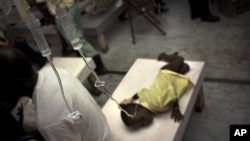Haiti's president and international humanitarian officials are calling for an end to violent demonstrations linked to Haiti's cholera epidemic, saying they are hampering aid efforts.
President Rene Preval made the appeal in an address Tuesday.
The United Nations has called on protests to stop immediately so Haitian and international workers can save lives.
United Nations humanitarian coordinator Nigel Fisher says the world body has been forced to cancel flights carrying aid supplies because of security concerns in Cap-Haitien and Port de Paix. The problems have also affected people's ability to get to the hospital and forced the suspension of a water cleaning project and training of medical staff.
Fisher also condemned an attack on a World Food Program warehouse, which was looted of food supplies and burned.
What prompted clashes?
The violence erupted Monday, with at least two people killed in clashes between demonstrators and U.N. peacekeepers. The protesters accuse U.N. peacekeepers from Nepal of bringing cholera to their Caribbean nation.
Health officials said Tuesday the death toll from the waterborne disease had reached 1,034 as of Sunday.
Authorities say more than 16,700 people have been hospitalized since the outbreak was first reported late last month.
Spread to Dominican Republic
|
CHOLERA PREVENTION & SYMPTOMS |
|
Watch Out For:
|
Meanwhile, health officials in the Dominican Republic, which shares the island of Hispaniola with Haiti, say they have detected their nation's first case of cholera. Officials say the disease was found in a Haitian man who is receiving treatment.
Dr. Jon Andrus, deputy director of the Pan American Health Organization, part of the U.N.'s World Health Organization, said Tuesday that an outbreak in the Dominican Republic would not be as severe as the outbreak in Haiti, because sanitary conditions there are not as bad as they are in Haiti.
Health workers fear an explosion of the disease in Haiti's capital, Port-au-Prince, where hundreds of thousands of people have been living in crowded, squalid tent cities since the January earthquake that devastated the country.
Long duration
The World Health Organization says the bacteria that causes the disease will be in Haiti for years.
Cholera is spread through fecal-contaminated food and water. It causes vomiting and diarrhea, and can quickly lead to severe dehydration and death. Hospitals and clinics in Haiti are now struggling to treat a growing number of people suffering from diarrhea and dehydration.




